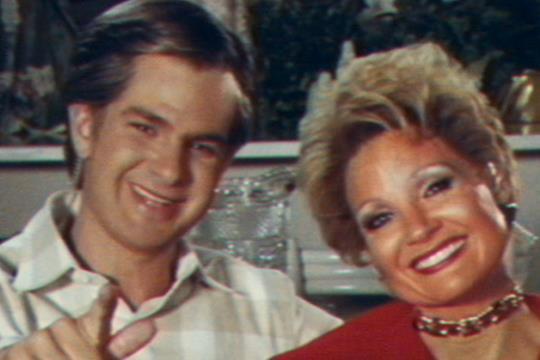
Here is what most depictions of late-twentieth-century religion get wrong. They tend to try to frame the story of health-and-wealth gospels and televangelists within traditional, even ancient, tropes. The materialist Christians are swindlers or conmen, like Harry Powell (Night of the Hunter), Elmer Gantry, or Jonas (Leap of Faith). Or they are persecuted martyrs with stories told by true believers. (Just about any film from a “Christian” production company feeds this persecution complex.) The Eyes of Tammy Faye recognizes that there is no delusion like self-delusion, and while it does present Tammy Faye Bakker as a victim of her husband’s infidelity and Jerry Fallwell’s duplicity, it also paints a painful portrait of the relationship between simplicity and duplicity. Late in the documentary, Tammy Faye revisits the site where she lived in luxury, lamenting rather than reflecting on the loss of privilege. Whether she is confronting a reporter that broke the story leading to her husband’s incarceration or pitching a talk show to a sympathetic but unimpressed television producer, Tammy Faye’s air of entitlements never quite disappears. She is brought low but never feels chagrin, and she never (to my understanding) repents. Even when talking about her drug addiction she blames her naivete. There are plenty who will see in Tammy Faye an early sympathizer with gay and/or transgender Christians, and that buys her some sympathy. She recognizes that the treatment of others is contrary to the gospel so many around her preach and that she preaches herself. But this narrow avenue comes off more like what alcoholics call a “moment of clarity” rather than a true epiphany, as it never escapes the neat confines of the Tammy-as-victim metanarrative that drives her interpretation of everyone else. Sadly, that metanarrative is all too familiar, and the documentary charts a flaw in American Christianity that helped lay the foundation for the grievance-based tribalism that plagues the modern world and dulls the cognitive dissonance created by an institutional practice further and further removed from anything resembling its Biblical antecedent.. — Kenneth R. Morefield (2023)
Arts & Faith Lists:
2023 Top 25 Spiritually Significant Documentaries — #19